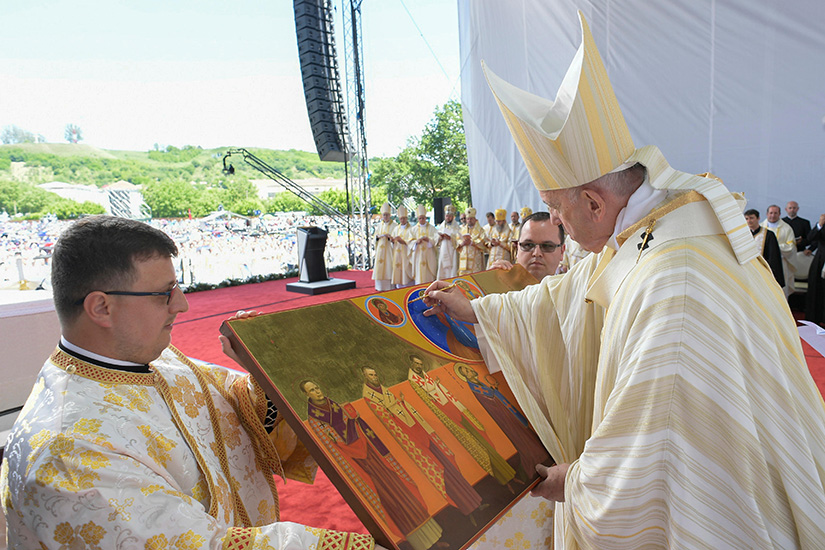BLAJ, Romania — The memory and witness of Romania’s martyred bishops are a reminder that Christians are called to stand firm against ideologies that seek to stifle and suppress their cultural and religious traditions, Pope Francis said.
On the last leg of his visit to Romania June 2, the pope celebrated a Divine Liturgy during which seven Eastern-rite Catholic bishops, who died during a fierce anti-religious campaign waged by the communist regime in Romania, were beatified.
“These pastors, martyrs for the faith, re-appropriated and handed down to the Romanian people a precious legacy that we can sum up in two words: freedom and mercy,” the pope said.
According to the Vatican, an estimated 60,000 people filled Blaj’s Liberty Field, while some 20,000 people followed the liturgy on big screens set up in various squares around the city.
For Eastern Catholics in Romania, the field — located on the grounds of Blaj’s Greek Catholic Theological Seminary — is both a symbol of national pride and sorrow.
 Pope Francis marked an icon of seven martyred bishops of the Eastern-rite Romanian Catholic Church during their beatification at a Divine Liturgy at Liberty Field in Blaj, Romania, June 2.Photo Credits: Vatican MediaIt was at Liberty Field in 1948, during the 100th anniversary of the Romanian nationalist revolution, that communist authorities suppressed the Eastern-rite Romanian Catholic Church.
Pope Francis marked an icon of seven martyred bishops of the Eastern-rite Romanian Catholic Church during their beatification at a Divine Liturgy at Liberty Field in Blaj, Romania, June 2.Photo Credits: Vatican MediaIt was at Liberty Field in 1948, during the 100th anniversary of the Romanian nationalist revolution, that communist authorities suppressed the Eastern-rite Romanian Catholic Church.
Men, women and children, many dressed in traditional outfits, held up images of the seven martyred bishops who gave their lives defending their faith: Bishop Ioan Suciu, apostolic administrator of Fagaras and Alba Iulia, ; Auxiliary Bishop Vasile Aftenie of Fagaras and Alba Iulia; Bishop Valeriu Traian Frentiu of Oradea Mare; Auxiliary Bishop Tit Liviu Chinezu of Fagaras and Alba Iulia; Bishop Ioan Balan of Lugoj; Bishop Alexandru Rusu of Maramures and Bishop Iuliu Hossu of Gherla, who had been named a cardinal by St. Paul VI “in pectore” or in his heart, withholding publication of his name until 1973.
In his homily, the pope remembered the sufferings of Eastern-rite Catholics who were forced to “endure a way of thinking and acting that showed contempt for others and led to the expulsion and killing of the defenseless and the silencing of dissenting voices.”
The martyred bishops left a “spiritual patrimony” for future generations demonstrated by their “exemplary faith and love for their people,” the pope said. Their faith, he added, was matched only by their willingness to suffer martyrdom “without showing hatred toward their persecutors and indeed responding to them with great meekness.”
On his final stop before departing for Rome, Pope Francis visited members of the Roma community living in the neighborhood of Barbu Lautaru. According to the Vatican, a newly erected church and pastoral center were built to assist the Roma community to fully integrated within the social fabric of the city of Blaj.
“In the Church of Christ, there is room for everyone,” the pope told members of the community, “otherwise it would not be the Church of Christ.”
The pope told the Roma community that his heart was heavy due to “the many experiences of discrimination, segregation and mistreatment experienced by your communities,” inflicted upon them, including by members of the Catholic Church.
Leave divisions behind, embrace fellowship
At a Marian shrine in the heart of Transylvania, Pope Francis called on Romania’s Catholics to leave resentments behind and to embark on a journey of unity.
Celebrating Mass June 1 at the Sumuleu Ciuc shrine, an important place of pilgrimage for Romanians and for Catholics from across the border in Hungary, the pope called on the faithful to ask God “for the grace to change past and present resentments and mistrust into new opportunities for friendship.” The pope said that “complicated and sorrow-filled situations from the past must not be forgotten or denied, yet neither must they be an obstacle or an excuse standing in the way of our desire to live together as brothers and sisters.”
Tens of thousands of pilgrims wearing colorful raincoats, surrounded by green pine forests clouded by mist, waited for the pope outside the shrine. Rain, mud and fog did little to dampen their spirits as they sang and waved happily awaiting the pope’s arrival.
Unite against ‘culture of hate’
In an increasingly globalized world where technological and economic developments have both benefited and excluded many, the Catholic and Orthodox churches must learn to listen to each other and walk together, Pope Francis said.
Meeting with Romanian Orthodox Patriarch Daniel and the Permanent Synod of the Romanian Orthodox Church May 31, the pope said both churches must “go out and engage” with their flocks who fall prey to the uprooting of “traditional values and weakening ethics and social life” that “leads to attitudes of rejection and hate.”
The pope called on the leaders of both churches to “help one another not to yield to the seductions of an individualistic ‘culture of hate’ that, perhaps no longer ideological as in the time of the atheist persecution, is nonetheless more persuasive and no less materialist.”
In his address to the permanent synod, the pope recalled St. John Paul’s visit 20 years earlier, which he said not only contributed to “renewed relations between Orthodox and Catholics in Romania, but also to the Orthodox-Catholic dialogue in general.”